Africa, with its diverse cultures, rich resources, and burgeoning economies, presents a mosaic of opportunities and challenges for businesses. Understanding the intricate tapestry of the African business landscape is key to successful market entry and sustainable growth. In this comprehensive guide, we delve into the nuances of navigating the business environment in Africa, exploring the diverse factors that shape this dynamic terrain.
The Essence of Africa’s Business Landscape
1. Cultural Diversity: The African Mosaic
Africa is not a monolithic entity but a tapestry of cultures, languages, and traditions. Each region and country within the continent has its unique identity. Understanding and respecting this diversity is fundamental for any business seeking to establish a foothold. Language nuances, cultural norms, and business etiquettes vary significantly, influencing consumer behavior and business interactions.
Action Point: Prioritize cultural intelligence. Invest time in understanding local customs, languages, and traditions. Tailor your marketing and business strategies to resonate with the specific cultural contexts of your target market.
2. Regulatory Dynamics: Navigating the Legal Landscape
The regulatory environment in Africa is diverse and can vary widely from one country to another. While some countries have embraced economic liberalization, others may have stringent regulations. Understanding the legal framework is crucial for compliance and risk management. This includes gaining insights into tax laws, labor regulations, and industry-specific requirements.
Action Point: Conduct thorough due diligence on the regulatory landscape of the target market. Engage local legal experts to navigate the complexities and ensure full compliance with local laws.
3. Economic Realities: Opportunities Amidst Challenges
Africa’s economic landscape is a mix of emerging opportunities and persistent challenges. While many African countries have experienced robust economic growth, disparities exist. Dissecting the economic realities involves analyzing factors such as GDP growth, inflation rates, and currency fluctuations.
Action Point: Collaborate with local economists and analysts to understand the economic trends specific to your target market. This information is crucial for making informed decisions about market entry, pricing strategies, and investment.
4. Infrastructure Challenges: Navigating Physical Barriers
Infrastructure varies widely across the continent, from advanced facilities in urban centers to underdeveloped regions with limited access to basic amenities. Understanding the infrastructure challenges is vital for supply chain management, logistics, and distribution strategies.
Action Point: Develop agile and flexible supply chain strategies that can adapt to diverse infrastructural conditions. Explore partnerships with local logistics providers to optimize distribution networks.
Strategies for Navigating the Business Landscape
1. Market Research: The Foundation of Informed Decisions
In-depth market research is the bedrock of successful market entry. It involves understanding consumer behaviors, market trends, and competitor landscapes. A nuanced market research strategy should include both quantitative and qualitative analyses.
Action Point: Commission comprehensive market research that includes surveys, focus group discussions, and competitor analyses. Leverage local market research firms for nuanced insights.
2. Local Partnerships: Building Bridges for Success
Establishing local partnerships is a strategic move for businesses entering African markets. Local partners bring valuable insights, networks, and cultural understanding. Forming strategic alliances can facilitate smoother market entry and help overcome initial hurdles.
Action Point: Identify and engage potential local partners who align with your business goals. Establishing strong relationships with local stakeholders can open doors to opportunities that might be challenging to access independently.
3. Technology Adoption: Harnessing Innovation
Technology adoption is transforming business landscapes across Africa. Mobile technologies, in particular, have leapfrogged traditional infrastructural challenges. Embracing innovative technologies is not only a competitive advantage but also a necessity for businesses aiming for long-term sustainability.
Action Point: Explore technology solutions that align with the local context. Mobile payment systems, e-commerce platforms, and digital marketing strategies can revolutionize your business operations.
4. Sustainability and Corporate Social Responsibility (CSR): Building Trust
A commitment to sustainability and CSR is increasingly becoming a differentiator in the African market. Consumers and stakeholders are placing a premium on businesses that contribute positively to local communities and the environment.
Action Point: Integrate sustainable practices into your business model. Engage in community development initiatives that align with local needs. This not only builds trust but also enhances brand reputation.
Success Stories: Navigating the African Business Landscape
1. MTN Group: Embracing Mobile Connectivity
MTN Group, a South African multinational mobile telecommunications company, exemplifies the power of understanding local needs. Recognizing the widespread use of mobile phones across the continent, MTN strategically positioned itself as a leading mobile service provider. By embracing technological innovations, especially mobile money services, MTN has not only connected millions but also contributed significantly to financial inclusion.
2. Safaricom’s M-Pesa: Revolutionizing Financial Inclusion
Safaricom’s M-Pesa, based in Kenya, is a pioneering example of leveraging technology to overcome infrastructural challenges. M-Pesa’s mobile money platform has transformed the way financial transactions occur in Kenya and beyond, offering a convenient and accessible solution for the unbanked population.
3. Shoprite: Adapting to Local Tastes
South African retail giant, Shoprite, has succeeded by tailoring its offerings to local preferences. Understanding the diverse culinary habits and preferences, Shoprite stocks a wide array of products catering to different cultural backgrounds. This adaptability has made Shoprite a go-to destination for consumers seeking a diverse range of products.
A Continual Journey of Learning and Adaptation
Navigating the business landscape in Africa is not a one-time effort but a continual journey of learning and adaptation. Successful businesses in the African market are those that embrace diversity, understand local nuances, and respond flexibly to the evolving economic and cultural dynamics.
As you embark on this journey, remember that the African business landscape is as much about building relationships as it is about making profits. Engage with local communities, understand their needs, and contribute positively to the growth story of the continent. In doing so, your business can not only thrive but also become an integral part of Africa’s vibrant economic tapestry.

